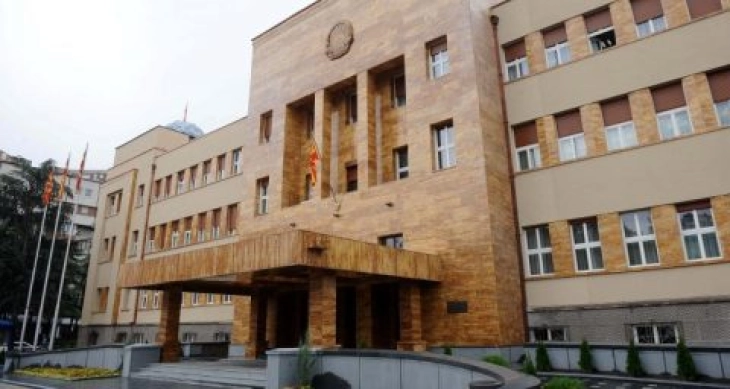Parliament begins debate on Budget revision
- The Parliament begins a three-day debate on Monday to discuss the 2024 Budget revision among other proposed laws. The amended proposal for the 2024 Budget revision, now in its second reading, is set as the seventh item on the session’s agenda.

Skopje, 12 August 2024 (MIA) - The Parliament begins a three-day debate on Monday to discuss the 2024 Budget revision among other proposed laws. The amended proposal for the 2024 Budget revision, now in its second reading, is set as the seventh item on the session’s agenda.
According to the Parliament's Rules of Procedure, the debate on the Draft of the Budget, i.e. the amended proposal for the Budget revision shall take a maximum of three (3) days. During the debate, a Member of the Assembly shall be entitled to speak a number of times in a total duration of up to 20 minutes, and the Co-ordinators of parliamentary groups of up to 30 minutes. A Government representative shall be entitled to speak a number of times in duration of not more than 30 minutes.
The Budget revision has been approved following its general debate and amendment discussion in the Parliament’s Finances and Budget Committee. On August 6, the Government approved the revised budget, which allocates additional funds for wages and equipment across multiple institutions.

In an interview with the national broadcaster over the weekend, Minister of Finance Gordana Dimitrieska Kochoska said the Budget revision provides funds for all obligations according to the law.
"Great pressure on the Budget comes from the payment of guarantees, i.e. loans for certain public enterprises that are unable to repay them," said Dimitrieska Kochoska.
According to her, the Budget revision includes plans for everything that is to be paid in accordance with the law and legal amendments.
"Funds are also provided for overdue obligations, which, though overdue, were not recorded at all in the ESPEO system of the Ministry of Finance. In doing so, we give priority to servicing what is certain to be paid in accordance with the law. Some of the overdue obligations are being audited, after which payments will be made according to the established analyses. We are at a stage where we can spend as much as we collect in order not to create an additional budget deficit, which has already increased by EUR 181 million," the Minister said.
She added that the payment of guarantees puts serious weight to the Budget, which affects the realization of investments.
"This is serious weight put on the Budget from the payment of the guarantees, because due to corruption and crime some enterprises have been destroyed and all this falls on the burden of the state. Instead of providing EUR 100 million for investments in health, education, etc., we need to return guarantees, i.e. loans to public enterprises that are unable to return them. For example, we are servicing EUR 90 million for the Public Enterprise for State Roads alone this year. If until last year this company was able to pay one instalment a year, now it can't service a single one," Dimitrieska Kochoska pointed out, adding that this is happening at a time when the Budget is in a difficult situation, and the state as a last resort must provide money to repay the loans.
As regards the announced linear increase in pensions, she believes it is something that pensioners deserve.
"If you add 5,000 denars to someone with a pension of 13,000 denars, you are giving them money to survive, taking into account the increased costs. We are just changing the methodology by which we focus on those with lower pensions getting a larger amount and thereby reducing the gap with higher pensions," the Finance Minister said.
According to her, the bilateral loan from Hungary does not put additional pressure on the Budget, because, she noted, the amount of EUR 500 million has been foreseen by the previous government.
"What we are doing is providing cheaper money. That is, if we had gone ahead with issuing a Eurobond, we would have received funds with an interest rate of over 6%, and this loan has an interest rate of 3.25%," said Dimitrieska Kochoska.
The Minister noted that the public debt can be sustainable through dealing with the informal economy and that an important aspect is how the borrowed money is spent, i.e. whether it is spent on investments.
Elaborating last week on the Budget revision adopted by the Government, Dimitrieska Kochoska pointed out that it secures over 4.1 billion denars for salaries, 5.1 billion denars for pensions, 800 million denars for recipients of guaranteed minimum assistance, 1.7 billion denars for health care protection, one billion for TIDZ, 1.7 billion for subsidies in agriculture, 437 million for student meal and 207 million for scholarships, as well as six billion denars for projects in municipalities.
The Budget revision provides additional funds for several institutions including the State Election Commission (SEC), the Commission for the Protection of Competition, the Personal Data Protection Agency, the Ministry of Interior (MoI), the Council of Inspection Authorities, the Ministry of Education and Science, the Ministry of Transport and Communications, the Customs Administration, the judiciary, the Public Prosecutor's Office, the Ombudsman, the Council of Public Prosecutors, the Macedonian Academy of Sciences and Arts (MANU)...
Monday’s parliamentary session will include a total of 34 items on the agenda.
The session will cover proposed amendments and additions to laws related to culture, transportation, urban planning, forests, hunting, sports, which are set to be passed through expedited procedures. The agenda also includes proposal for spatial plan of National Park Pelister 2016-2030.
Additionally, Parliament will review the proposal to designate the Matka Canyon and Lake Ohrid as natural monuments and the Studenchishte Marsh as Nature Park.
Photo: MIA archive







